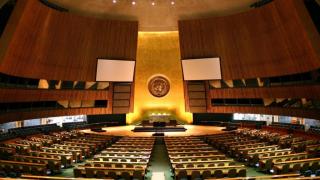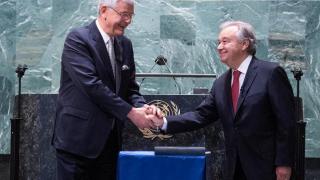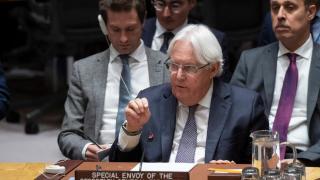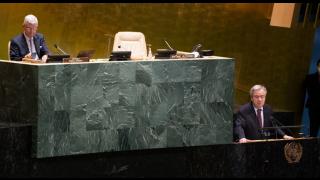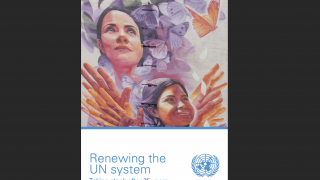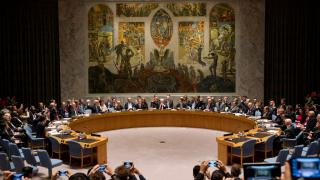
The UN Security Council held its fourth round of straw polls on 9 September to determine which candidate it will put forward to replace Ban Ki-moon as the next Secretary-General.
Find out more about the process of straw polls
This latest round saw the former Prime Minister of Portugal and former head of the UN Refugee Agency, Antόnio Guterres, maintain his lead for the fourth time running. Miroslav Lajčák (Slovakia) and Vuk Jeremić (Serbia) also maintained their positions in second place and third place respectively. All three candidates had one fewer “discouraging” vote.
While the Security Council, despite differing views on this within its membership, has not formally released the results of the polls, the results have been leaked and publicised widely on Twitter after every poll.
View the results of the most recent and previous straw polls
The fourth round saw Srgjan Kerim (FYROM) rise from sixth to fourth place, with eight “encourage” votes, followed by Bulgaria’s Irina Bokova with seven, and Danilo Türk from Slovenia in the sixth place, also with seven “encourage” votes. Susana Malcorra (Argentina) dropped to seventh place followed by Helen Clark (New Zealand), who dropped to eighth position. Christiana Figueres, who ranked in ninth position, withdrew her candidacy shortly after the fourth poll "in order to expedite the process". Natalia Gherman received the lowest score with three "encourages".
The Council’s decision to recommend a candidate as Secretary-General to the General Assembly is considered a matter of substance requiring an affirmative vote of nine members, with its permanent five members voting in favour or abstaining, i.e. not exercising their power to veto. In the latest round, only two candidates - Guterres and Lajčák - had nine states or more “encouraging” them, sufficient for the necessary number of affirmative votes. All candidates received “discourage” votes, with Guterres receiving the lowest number, three.
It is not known at this stage which of the candidates' "discouraging" votes might be from veto-carrying members. Things will become clearer in October, when the Council intends to hold its first colour-coded straw poll, which distinguishes between veto-carrying and non-veto-carrying members. However, a straw poll is not an official Council vote. While a so-called red ballot "discouraging" a candidate represents a potential veto, the casting of red ballots during coloured straw polls has not prevented a candidate from becoming Secretary-General in the past.
What next?
Two more straw polls are planned for 26 September and the first week of October. Both will be overseen by Russia. New Zealand would normally have overseen the first as Council President for September, but as it has a candidate running, it asked Russia to step in to avoid any perception of conflict of interest. Russia, which holds the October presidency, is also expected to organise the first colour-coded straw poll, which will show whether or not there is agreement among the veto-carrying members, before all Council members proceed to vote in a resolution recommending one (or more) candidate(s) to the General Assembly. The Assembly will then appoint the next Secretary-General in a resolution, the contents of which the Assembly will begin to discuss on 29 September. The discussions are expected to include the option of a longer, single term.
After the withdrawal of two candidates, those who did less well are likely to be under pressure to follow suit. Matthew Rycroft, Britain’s ambassador to the UN, is one of those publicly encouraging low-scoring candidates to drop out, telling reporters "the whole point of the straw polls is to gradually winnow down the field".
To complicate matters, speculation among UN commentators is rife that a further candidate may be entering the race. Kristalina Georgieva, the European Commission vice-president from Bulgaria, has been named in the press as a possible late entrant to the race. UNA-UK and the 1 for 7 Billion campaign would want to see the same level of scrutiny applied to any future candidate that may enter the race, including an informal dialogue at the General Assembly at the earliest opportunity to allow the wider UN membership and civil society the chance to have interacted with all candidates.
Should it be a woman?
The outcome has again attracted criticism from those calling for a woman to head the UN. The Woman SG Campaign said they were “shocked and disappointed” by the lack of support for women candidates within the Security Council.
Discussing these concerns in an interview with the International Business Times, UNA-UK's Executive Director, Natalie Samarasinghe - who co-founded the 1 for 7 Billion campaign - expressed her disappointment that the straw polls had seen highly-experienced women do less well than men with less experience. But she pointed out that “some of the criticism stems from the sadly misplaced hope that the Council's view of what makes a good UN chief matches that of civil society”.
She was keen to emphasise that ultimately, the next UN leader must be selected on merit, stating that, "It would be an insult to any candidate – especially the women – to suggest the Secretary-General be appointed for any other reason".
Photo: copyright UN Photo

